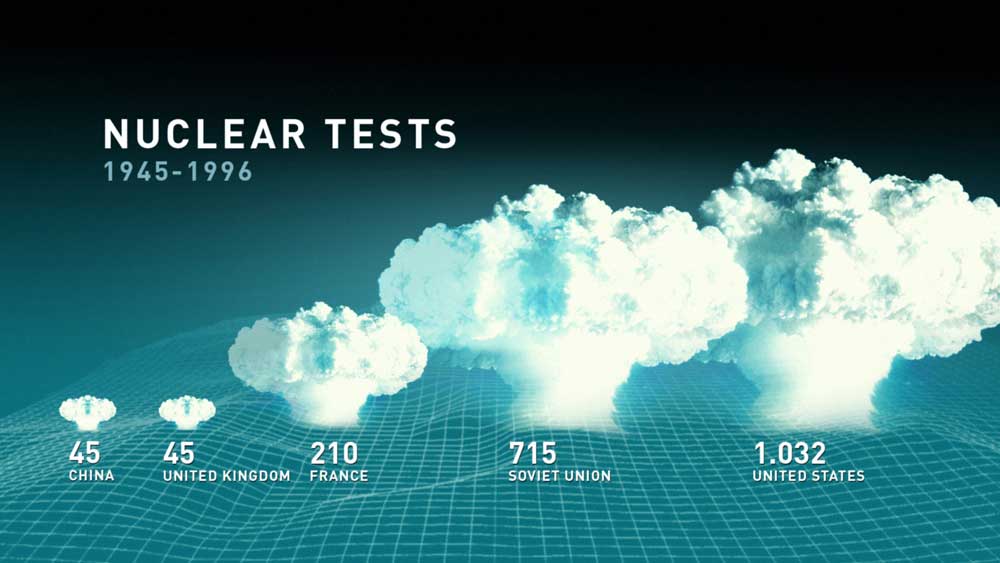Test Ban Treaties
There are two agreements that regulate nuclear test explosions. The first is the Partial Test Ban Treaty (PTBT) of 1963 and the second is the Comprehensive Nuclear-Test Ban Treaty (CTBT) of 1996.
The Partial Test Ban Treaty (PTBT) prohibits test explosions in the atmosphere, underwater and in space. The Comprehensive Nuclear-Test Ban Treaty (CTBT) prohibits above- and below-ground, underwater, space, and peaceful test explosions. The latter agreement has not yet entered into force, but a moratorium on nuclear weapons tests is accepted by all states, except North Korea.
Partial Test Ban Treaty (PTBT)
The potential risks of test explosions were recognized early on, and as early as 1958 efforts were made to establish an agreement to regulate test explosions. Initially, the United States and United Kingdom promised a one-year moratorium on their test explosions, which the Soviet Union joined a few days later. The hiatus collapsed in 1961 due to political tensions and military developments. The Soviet Union resumed its test explosions, closely followed by the United States.
Around the world, people also began to realize the risks of radioactive radiation from the nuclear weapons tests and pressure increased on the nuclear weapon states to do something about the problem. In 1963, the Soviet Union, the United States, and the United Kingdom negotiated the Partial Test Ban Treaty (PTBT), which prohibited nuclear weapons tests in the atmosphere, in space, and under water. France and China did not join the agreement.
The problem with the PTBT was that it did not prohibit underground test explosions and the development of new types of nuclear weapons. Even underground explosions can give rise to the spread of radioactivity. This is because the test explosions often blow holes in the earth’s crust and radioactive material is spread into the air.
Nor did the PTBT regulate reductions in the nuclear arsenals that already existed in the world. In fact, the nuclear weapons states increased the rate of their test explosions after 1963 and the nuclear arsenals doubled between 1963 and 1970.
Comprehensive Nuclear-Test Ban Treaty (CTBT)
In order to limit the possibilities for new development of nuclear weapons and counteract the risk of new states producing and acquiring nuclear weapons, they saw a strong need for a stronger agreement than the PTBT. In 1996, the UN adopted the Comprehensive Nuclear-Test Ban Treaty (CTBT) which had been negotiated at the Conference on Disarmament in Geneva.
The CTBT prohibits all nuclear test explosions regardless of whether they take place above or below ground, underwater or in outer space. Even so-called nuclear explosions for peaceful purposes are prohibited by the CTBT, however, nuclear weapons tests by other methods are not prohibited.
Pending entry into force
To enter into force and become part of international law, the CTBT must be signed and ratified by all 44 countries in the world that have nuclear power reactors. Today (October 2023), three such countries: India, Pakistan and North Korea have not signed the agreement, while another five: China, Egypt, Iran, Israel, the United States have not ratified.
In total, 187 states have signed the agreement and 178 states have ratified the agreement. While waiting for the agreement to enter into force, the nuclear weapons states have stated that they will maintain a pause in their test explosions. This moratorium has been accepted by all nuclear weapon states except North Korea.
At the 2000 Review Conference of the Non-Proliferation Treaty, a decision was made that no nuclear explosions should be carried out pending the entry into force of the CTBT. A principle that India and Pakistan also seem to subscribe to, despite the fact that they are not parties to either the Non-Proliferation Treaty nor the CTBT.
After India’s and Pakistan’s May 1998 test explosions, these states immediately declared themselves nuclear powers, but at the 2000 conference it was determined that the tests did not entitle them to such status or other special status. The two countries were called on, along with Israel and North Korea, to immediately and unconditionally accede to the Non-Proliferation Treaty as non-nuclear-weapon states and dismantle their nuclear arsenals.
Regardless of whether all countries declare a test detonation moratorium, it is still important that the CTBT enters into force in order to become legally binding. The CTBT is an important step in the non-proliferation of nuclear weapons because the agreement in principle prevents the development of new nuclear weapons. The agreement also seeks to stop the qualitative arms race, where the nuclear weapon states may not increase their arsenals in number, but instead in function and capacity. The CTBT does not prohibit research into nuclear weapons, but it is difficult to develop new nuclear weapons without a test explosion.
Comprehensive Test Ban Treaty Organization
In order to control the compliance of the agreement by the member states, the agreement established an organization: Comprehensive Test Ban Treaty Organization (CTBTO). A preparatory commission for this organization works to facilitate the agreement to enter into force as soon as possible, and for the global monitoring system IMS to function smoothly once the agreement becomes international law.
IMS has several hundred monitoring stations and several laboratories around the world that check if any country carries out test explosions. With the help of seismological measuring instruments, hydroacoustics and infrasound, one must be able to check underground, underwater and in the atmosphere. The laboratories have modern technology that can detect signals of radioactive emissions from test explosions.
The CTBTO cannot fully act before the agreement enters into force, but the international monitoring system is already in use. Today, over 200 monitoring stations send in important information to monitor seismic events (earthquakes, tsunamis, etc.) and be able to determine whether these are nuclear explosions.
Sources and more information
Treaty Banning Nuclear Weapon Tests in the Atmosphere, in Outer Space and Under Water, United Nations Office for Disarmament Affairs
Partial Test Ban Treaty, Nuclear Threat Initiative, NTI
Nuclear Testing, Nuclear Age Peace Foundation
Who we are, CTBTO
Ending Nuclear Tests, CTBTO
Member States, CTBTO





